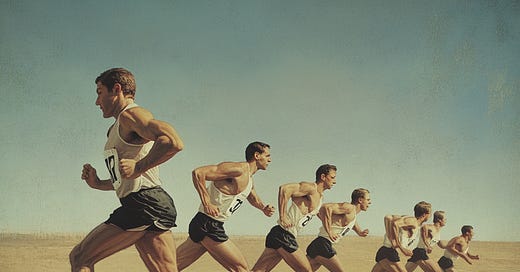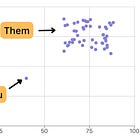The podcast centers on the idea of rejecting comparison and external validation in favor of defining personal success and pursuing a unique, self-defined path. It argues against the damaging effects of social comparison, particularly in our hyper-connected world, and advocates for focusing on internal drivers like passions and talents.
Original article is here:
Key Ideas and Facts:
The Trap of Comparison:
The author describes the negative experience of social media comparison: "I spent countless hours scrolling through Facebook, LinkedIn, and Instagram, feeling that familiar knot in my stomach tighten with each post I read."
Akan highlights how we are constantly exposed to "everyone's highlight reels and carefully curated success stories that show the summit but never the climb," leading to feelings of inadequacy.
He emphasizes that "this constant game of comparison isn't just exhausting—it's impossible to win."
This comparison is not only limited to social media but can also occur in work environments where individuals watch others get promoted and celebrated and question their own progress.
Running the Wrong Race:
The core analogy is that chasing others' definitions of success is like "runners who've wandered into the wrong race."
This is further illustrated by examples like "tennis players trying Olympic weightlifting or swimmers forcing ourselves into a long run." It highlights that we might be capable, but in the wrong arena.
The author argues that when we try to meet other people’s definitions of success, we are "trying to win someone else's race by playing by their rules."
The Futility of the "Catch Up" Game:
Akan points out the impossibility of outcompeting everyone, stating: "There's infinite knowledge out there; someone will always know more than you do... You've already lost if your goal is to catch up or surpass everyone else."
He uses the analogy of "trying to drink from a fire hose" to illustrate the overwhelming nature of trying to keep pace with others.
Creating Your Own Track:
The author proposes shifting focus from external competition to internal discovery: "Instead of trying to outrun everyone else, I've started focusing on creating my track."
This involves identifying:
What truly energizes you.
What you are naturally good at.
What makes you lose track of time.
These are described as "clues to where I can make my unique mark"
The article emphasizes the "sweet spot" where talents, passions, and opportunities intersect.
Measuring Against Your Potential:
When one finds their unique track, “The noise of others' achievements starts to fade. Their success stops feeling like your failure.”
The focus shifts from comparing to others to comparing against one’s own capabilities, “You begin to measure yourself not against others but against your potential.”
Courage and Authenticity:
Creating your own path "requires courage" and means "stepping away from the well-worn track that others are running on."
This also includes facing "uncertainty and possibly criticism."
However, the article stresses that "The discomfort of forging your path is far less painful than the constant agony of trying to be someone you're not."
He highlights that “groundbreaking achievements” occur when one is unapologetically themselves, using Steve Jobs and Frida Kahlo as examples.
The Call to Action:
The author challenges readers to: "Stop running someone else's race. Stop measuring your chapter 1 against someone else's chapter 20."
He suggests the following self-reflective questions:
"What unique perspective do I bring to my field?"
"What problems do I feel compelled to solve?"
"What would success look like if I defined it purely on my own terms?"
The Value of Unique Contribution:
Akan asserts that "The world doesn't need another copy of someone else's success story. It requires your unique contribution, your authentic voice, and your original path."
He acknowledges that forging your own path is "scary" and "full of uncertainty."
However, "it's the only race worth running—the one you define for yourself."
Focusing on Self-Improvement:
The author underscores that "The goal isn't to be better than everyone else. The goal is to be better than you were yesterday, running on your own track and toward your own vision of success.”
Refocusing on Your Path:
Akan suggests using feelings of inadequacy that might come from social comparison as a reminder to refocus on one’s unique path: "When you catch yourself scrolling through LinkedIn with that familiar sense of inadequacy, instead of letting it paralyze you, use it as a reminder to refocus on your own path, your own race, and your own finish line."
He concludes by stating that your own race is "the only race you are allowed to win.”
Overall Message: The article is a powerful call to self-discovery and authenticity. It encourages readers to break free from the trap of social comparison and to create a life and career that aligns with their individual talents, passions, and values. It emphasizes that true success comes not from outcompeting others, but from living a life defined by one's own terms.














Share this post